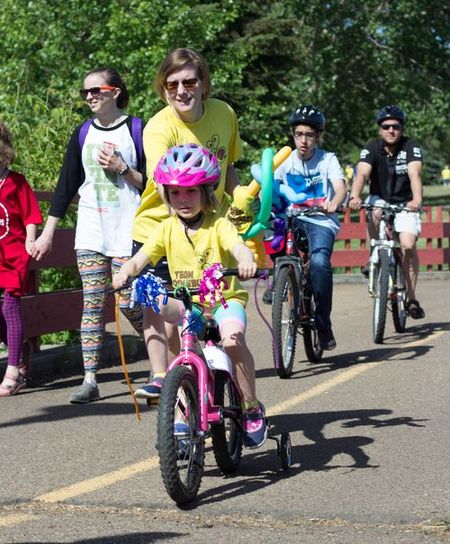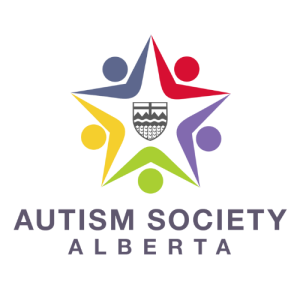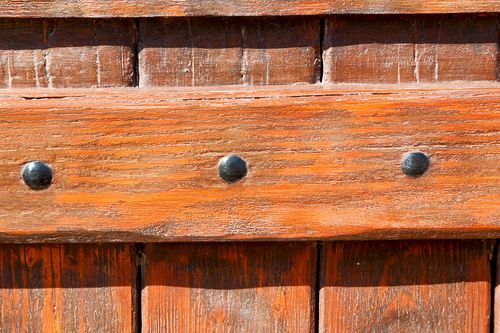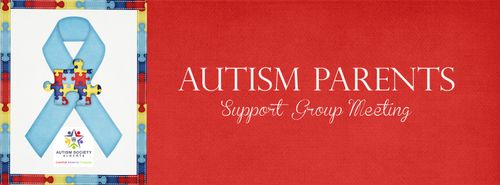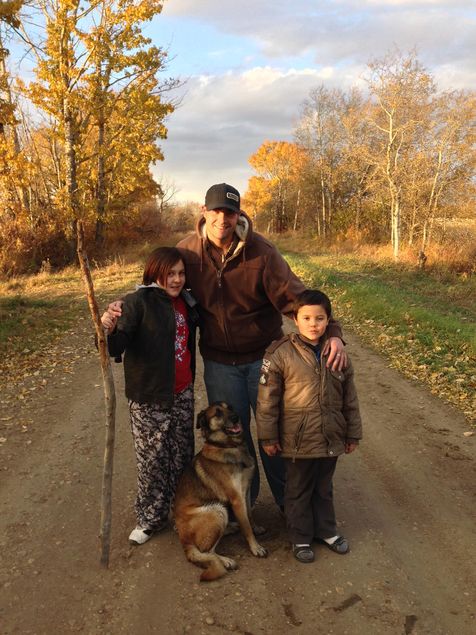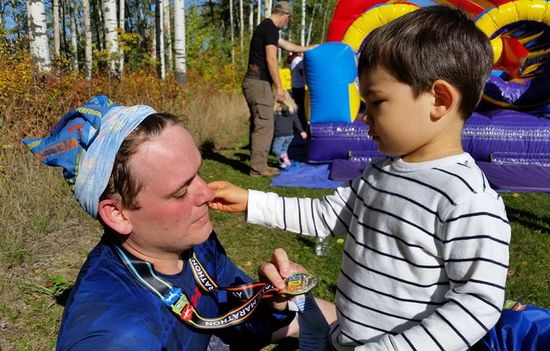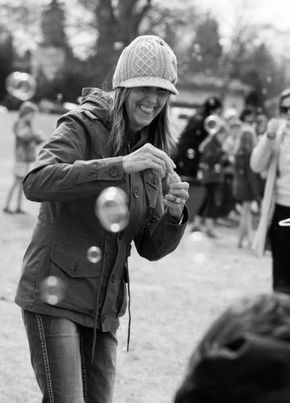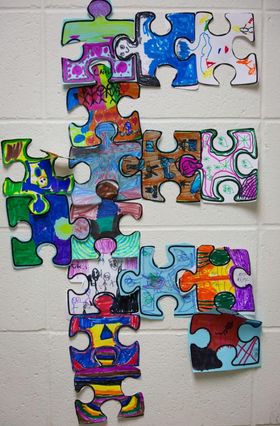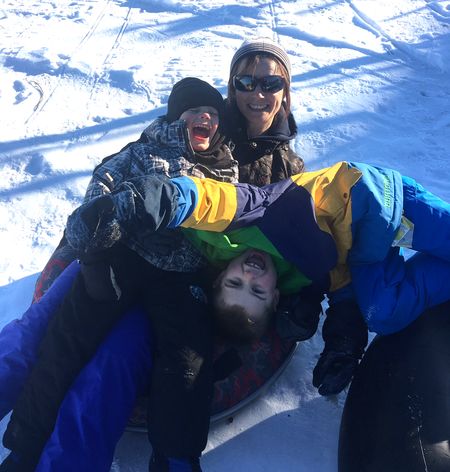Is Your Partner on the Spectrum?
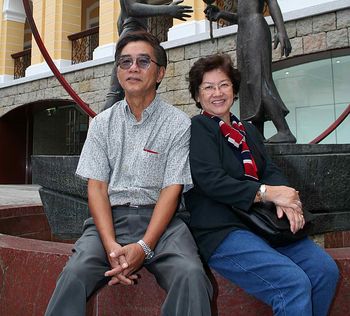 Is your relationship clearly difficult, but you feel you love each other? Are you like a couple trying to dance but not hearing the same rhythm? This year, Autism Edmonton started a drop-in discussion group for adults in relationship with individuals with ASD. Members learn about high functioning autism and have the opportunity to discuss their own experiences with others in similar situations. An official diagnosis of autism is not required.
Is your relationship clearly difficult, but you feel you love each other? Are you like a couple trying to dance but not hearing the same rhythm? This year, Autism Edmonton started a drop-in discussion group for adults in relationship with individuals with ASD. Members learn about high functioning autism and have the opportunity to discuss their own experiences with others in similar situations. An official diagnosis of autism is not required.
In the past year we have had two special information nights with professional speakers. Diane Hinves, PhD, a marriage and family therapist and psychologist with a special interest in neurology and how brain function may be affected by autism, and Cory Hrushka, psychologist and sex therapist, spoke to our group and answered questions. Other discussions were led by Support Services staff and volunteers. Topics we focused on were core aspects of autism, social needs of the neurotypical partner, lack of clarity around needs, and socializing as a couple.
Our discussions are affirming and educational. The sharing and problem solving we are able to do has made life a little easier for many participants, and we’d be happy to have interested people join us. In the group, we sometimes describe a situation that is driving us crazy, and everyone there says, “Yes, that’s exactly what happens! That’s really how it is!” We are used to hearing our friends say, “Oh, men are all like that”, or “Why do you put up with it?” This group gets it, and we go home feeling understood — and with some tools for future use.
Our meetings are the third Thursday of the month at 7 pm, except in summer. The next meeting is Thursday, May 19, at 7 pm at the Autism Society location: 101, 11720 Kingsway Ave., Edmonton. If you have questions, or would like to come to a meeting, please call 780-453-3971 and press 1 for Support Services.
Marie Walker
Co-leader, Partner’s Group
Popping Bubbles
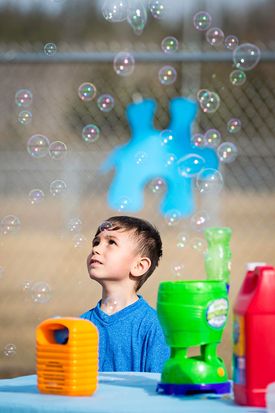
“You nailed it, guys,” I told them.
Our son, who we refer to as ‘The Captain’, looked at the paper completely mystified by my statement.
“I didn’t nail it,” he almost growled.
I took a mental note to explain the expression ‘nailed it’ at another time and hustled the kids into their shoes and out the door.
We were on our way to Bubbles for Autism.
It was a nice enough day that we were able to roll the windows down on the car as we ventured to the Captain’s favourite park to hang out with some of our favourite people in the city; a collection of souls who ‘get us’.
The wind was warm, and as it kicked up the spring dust I was overwhelmed by the sensation of new beginnings – the hopeful sentiment this season annually ushers in with its tree buds, chirpy birds and blue sky.
Both my husband and I were prepared for an exhausting day. The idea of an extended amount of free play, combined with hoards of unfamiliar people (not to mention the abundance of bubbles!) made us a little nervous. But today was Autism Awareness Day, and nothing would keep us away from the friends, colleagues and family members who continuously support us on this lifelong journey.
This day, to us, is about so much more than awareness.
Because, let’s face it, people are aware. They’re aware our son behaves differently. They’re aware the little girl in their daughter’s classroom has something called Autism Spectrum Disorder. They’re aware the child next door is non-verbal and runs away sometimes. However, understanding what any of these things mean and how to react in a positive, supportive capacity is a completely different ballgame. So we thought by joining (the surprisingly large number of) other autism families on April 2 to blow bubbles and celebrate this life, we were drawing awareness to ASD, as well as acceptance of who these beautiful people are.
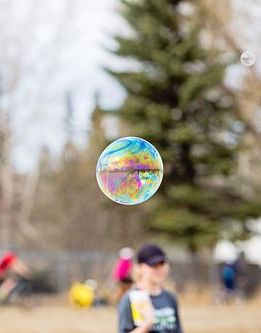
A bubble is a beautiful thing – a glossy orb that proves to be more luminous and radiant depending on its environment. The problem, however, is that there is no way to anticipate how big the bubble will be, which direction the bubble is heading or how long it will be heading there. Sometimes we can use our knowledge to find ways to guide the bubble one way or another, but sometimes the bubble leaps into the air, beyond our reach.
Bubbles are delicate. And as a society we work hard to be gentle with delicate things – think of how many times have we said, “don’t touch that, it might break.”
Autism can be compared to living inside of a bubble. We see our loved ones float freely, watching the world as they go, completely unaware of where they will end up.
But this bubble is meant to be touched.
This bubble is meant to be played with and enjoyed. As a society, we are meant to leap into the air and grab at this bubble – and if it pops, all that is lost is the stigma that autism makes one unreachable.
As families connected to autism, we have been popping bubbles for years – and we’ve collected undeniable skills while doing so. We’ve learned to run faster, reach higher, anticipate the direction we are headed, consider our environment and enjoy simplicity.
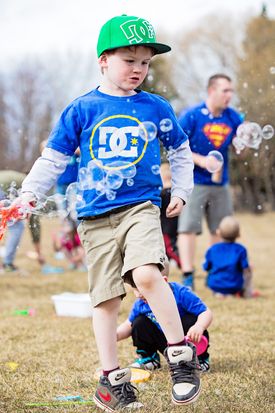
The hopeful sentiment of spring morphed into something much more beautiful than chirping birds and blue sky – it became about unified laughter and community acceptance. We weren’t just popping bubbles – we were bursting stigma.
While driving home from the event, my husband and I were going through the long list of impressive work done by the organizers, and happened to pass a home in the midst of construction.
“It was awesome to see so many people there,” my husband began, and before he could finish his thought, the Captain, mesmerized by the construction happening outside his window, interrupted from the back seat.
“Mom!” he shrieked excitedly, “they nailed it!”
The three of us stifled our giggles. His literal form of the expression had impossibly perfect timing.
It was exactly how we were feeling.
A sincere, deep thank you to those who worked on this year’s Bubbles for Autism. You nailed it.
This year’s Bubbles for Autism was held at the Parkland Class Accessibility in Red Deer and hosted approximately 200 bubble blowers.
Updates from Autism Society Alberta – Central Alberta Chapter
Autism Society Alberta – Central Alberta Chapter will be holding its monthly Autism Parents Support and Information Meeting on Monday May 9th from 6:00-8:00 pm at the GH Dawe Community Center (Meeting Room 2). The first 30 minutes of the meeting will be dedicated to letting everyone know about upcoming events in our community, as well as brainstorming ideas for future community events that parents might be interested in attending. The last 90 minutes of the meeting will be a facilitated discussion on a number of topics. The topic for May is “Dealing with Diagnosis”, and our facilitator’s will be Kerri-Ann Dalstra & Jessica Schurman.
We look forward to seeing you there!
Looking Ahead:
In June we are going to be screening the movie Jack of the Red Hearts at Carnival Cinemas.
Date: To be determined
Location: Carnival Cinemas, 5402 47 St., Red Deer
Time: Evening
Who Will Take Care Of Our Kids (When We No Longer Can)?
It seems to me that life with Anthony, my 27-year-old, low-verbal son with classical autism, is often about thinking scary thoughts and then figuring out how to face my fears. It’s about looking at a future in which very little, if anything, is already set up to accommodate Anthony’s basic needs, let alone ensure he has a good life. For a while, it was school. (We eventually found good classrooms with teachers who really wanted to teach Anthony.) Then, even scarier, we worried about what he would do when he graduated from high school? (We found a course at NorQuest College, then created Anthony at Your Service so he and others would have meaningful, paid work.)

It turns out we are not alone. When I brought up this question at an Autism Alberta board meeting a few months ago, every parent on the board, whether of older or younger children on the autism spectrum, identified with my fears. They all share concern that nothing currently exists that would provide the quality of life we want for our children, when we can no longer care for them.
Many of us do not have sufficient family who can manage care for our kids when we can no longer do it. We don’t see organizations, agencies or foundations in Alberta that are set up to do this in a caring, person-centred way. So what is in place elsewhere? Are there any models that can help us envision what we might want to put in place to manage our adult children’s lives when we are too aged, or tired or dead to be able to do it any more? What visions do we have that might help guide the creation of something that will ensure quality lives for our children as they mature through middle age and into old age themselves?
Autism Alberta’s Board of Directors has recently voted to engage one or two researchers to look more deeply into this question. We’d also like to hear thoughts from our membership. So let us know. I think it would be interesting to publish some of your thoughts and ideas in coming issues of Autism Around Alberta. We’d love to hear your thoughts and wishes on our Facebook parent group at https://www.facebook.com/groups/autismalberta/ – If you aren’t a member yet, apply to join and we’ll approve your membership. Your feedback will only be visible to other group members. If you’re not into social media, you can also send your thoughts to AAA@autismalberta.ca.
Embracing My Weirdness in the Philippines

Little did I know, my life was about to turn into something completely unrecognizable.
Growing up in Canada as an Aspie had its hard parts, especially for a child of the eighties who had to wait 15 years to receive a diagnosis, back before Asperger’s was “cool”. There was a lot of pain and frustration, in spite of the love I received from my parents, and the support of a few superstar teachers and school administrators. Although I had wrapped myself in the bubble of online schooling and ventured cautiously out into the real world through low-pressure volunteer work, I always felt the sting of being different – or as many people would less charitably put it, creepy and weird. At a volunteer appreciation night for one of the organizations I worked with, the emceeing staff member congratulated me on-mic for “how far I had come”, even though I had never tried to make a big deal out of my Asperger’s or ask for special treatment while volunteering there. It was a little bit touching, a little bit condescending, and overall just bewildering – And that wasn’t even one of the bad experiences!
I brought my “differentness” with me as I awkwardly interviewed for overseas placements in various countries across Africa, Asia, and even in Finland. When the interviewers asked me about how I would cope with power outages in Ouagadougou, my Aspergian anxiety came to the fore, and I bombed horribly. One organization even flew me out to Vancouver for a group assessment, where I panicked during their teamwork exercises and was cut from the program, after being assured that being cut almost never happened to anyone.
I hadn’t disclosed my condition in advance, hoping that I could succeed on my own terms, and in retrospect I probably should have disclosed – But that’s a topic for another article!
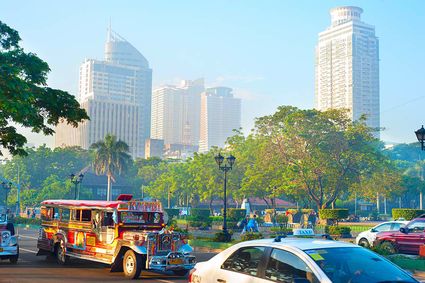
So I was off to Manila! I was a bag of nerves when I got off the plane, but after some initial adjustment to the climate and the crowds, and a first week spent stubbornly walking around the tropics in a fall jacket – overdressing was always one of my trademark quirks – I started to settle in and enjoy. I felt immediately at home with the incredibly friendly, chilled-out locals, and since chilling out had never been my strong point, this was a skill I was happy to have the chance to develop! One thing I realized quite quickly was that I was now in a place where my differentness came not from being an Aspie, but from being a foreigner – All in all, a great improvement. The people of Manila proved to be incredibly kind and hospitable, and their expectation for foreigners to be a bit different and eccentric meant that my unusual degree of oddness wasn’t so apparent, or at least not to everyone.
I was happy enough that I stayed, stringing together various local work and paid volunteer positions. It felt like a chance to be a different person: not the uptight cerebral Aspie who grew up hunched over the computer or with his nose buried in philosophy books, but a fun party animal, always ready to talk to new people, and perfectly happy in loud, crowded places – so much for any sensory issues! I learned to shut off my restless analytical brain and just enjoy my 20s. In other words, I adopted the local philosophy of bahala na – basically, que sera sera.
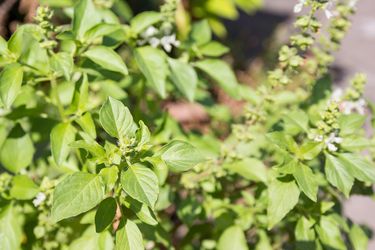
You might say it sounds like I just plain grew up, and there might be some truth to that; but I think there’s more to it. With all the stigma I suffered over who I was while growing up, it took me a long time to accept that I was never such a bad person to be. Of course, I’m happy to be more confident now, with a more positive outlook. I’m grateful that the anxiety, bitterness and rage that used to consume me are mostly gone, after so many years of finding acceptance with my amazing Filipino friends, and coming to terms with the fact that you can’t and don’t need to be accepted by everyone all the time.
But I also realized that the wiring of my Aspie brain was never really defective, even if I had to work through some of the more problematic bugs. I now recognize that, free of my old pessimism, constantly analyzing everything around me gives me a deeper appreciation and enjoyment of life. Solitary pursuits and personal projects often give me more pleasure than a night on the town, and that’s OK, too. I wish I could open my heart up more sometimes, but I remain grateful that my even emotional keel protects me from a lot of pain and sorrow. It took 11,000 km and almost a decade, but I learned to love my weirdness.
Rural, Remote and Northern Communities
Amber Young
Services and information about Autism Spectrum Disorder can be difficult to access outside of urban Albertan centres. In particular, rural, remote, and northern Alberta regions have unique needs related to ASD information and services. Autism Alberta, the University of Calgary, as well as community leaders and partners, are working together to better understand the information and resource needs related to ASD for rural, remote, and northern communities in Alberta.
In order to learn more, we want to talk to community members (that’s you!) touched by ASD. We are hoping you will share your knowledge to increase the understanding of the resources, gaps, strategies, and strengths that exist within your area. We will be hosting discussion groups in two selected regions over the next few months. We invite community members who have been touched by ASD (individuals with autism, family members, service providers, and other supporters) to participate in guiding the development of a strategy relevant to your community. The voices of individuals and families impacted by ASD are critical to this project. Only you can ensure issues are meaningfully addressed.
Our work has already begun! On March 15th, Dr. David Nicholas (University of Calgary), Dr. Deborah Barrett (Autism Alberta) and Kirsti Mardell (Fort McMurray community leader) hosted two initial teleconference calls for residents of Fort McMurray and surrounding areas to discuss and receive feedback regarding local resources and information. Thank you to all who joined us for providing valuable insight.
As we move forward, we will be scheduling in-person discussion groups in the Fort McMurray and Central Alberta regions to provide further time and space for community members to share perspectives and insight. If you live in either of these regions and are interested in participating in this project, please let us know.
Finding Community in Camrose
Amanda Dunsmore
Our son was nine years old and in grade three when he got his diagnosis: Asperger’s. We thought he might have some form of dyslexia or dysgraphia when we realized how hard he was struggling to learn to read and write, but the ASD (Asperger’s) diagnoses came out of left field for us — not because it wasn’t accurate, but because we really knew nothing about autism spectrum disorders.
Suddenly things started to make sense for us: there were the “tantrums” that we failed to recognize as acting out, the problems socializing, the stubborn resistance to change, the reading problems. There was the intense focus on things he liked for hours at a time, or the way he could remember everything he had ever heard about outer space, but couldn’t remember to take his laundry downstairs, and how the rules were the rules were the rules – no exceptions! I had thought of them as quirks – my sweet, funny, loving little boy doing his best to be wonderful for the adults in his life and not being able to relate to peers because he spent too much time around adults. It took our feet out from under us, and at the same time finally gave us firm ground to stand on. Now we could figure out what to do, how to help make things better for him – we had a place to start.
Fast forward a couple years. We had a good working relationship with the elementary school he had been attending; anything we ever needed to talk to his teachers about was heard and addressed quickly and with minimal fuss. Things should have been going well, right? Unfortunately, they weren’t, exactly. Social problems persisted, he was lonely and becoming sad that no one seemed to understand him. Sensory problems with light and noise continued to becoming increasingly difficult, leading to headaches and irritability. He was isolated and so was I. There were no weekly play dates; he would be willing to attempt socializing outside of school only a few times a year, and we decided not to pressure him. I don’t know how many times I wished there were other kids who could understand him, be patient with him and be willing to be his friends.
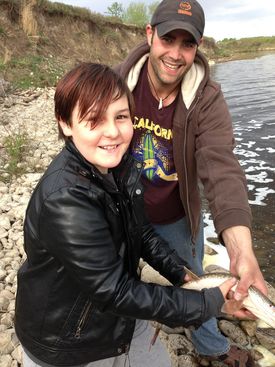
Read more of Amanda’s story
Visit the Autism Parents of Camrose Facebook group
Jeff’s Marathon Journey – April Update
Jeff Bowers
Here’s the latest news from Jeff’s Marathon Journey:
Hi everybody – this is my first stab at a monthly update that I hope to keep going until I finish my training and run the NYC Marathon later this year on November 6th.
First of all, let me start by saying a giant “THANKS!” to everybody that has donated so far! I can’t believe we’re at the $1500 mark already. I was a little tentative on pushing the fundraising campaign out so early (as the marathon itself isn’t for another 7 months), however I thought with April being Autism Awareness Month, and specifically with April 2nd being World Autism Awareness day (and the special connection with that also being my birthday), it was an opportune time to get the ball rolling with fundraising. I’ve tried to send a personal note to everybody who has donated so far, and I will continue to do so as the donations continue to roll in. If I missed anybody, I’m sorry, but please know we truly appreciate every penny that has been donated to date. The Fort McMurray Autism Support Group consists of a number of families, and is run by a wonderful group of dedicated parents and care providers. The activities and events they plan and carry out are entirely contingent on the funds available, and I’m honored to be able to help them out with this effort.
While we were early in rolling out the fundraising effort, the big plan to keep the drive going right up until I run the marathon, so if you haven’t donated yet there is still plenty of time!
An update on the training:

The Windsor Half will give me a good indication of where my overall fitness level is, and will line up perfectly for when I return to Canada and commence my official 20-week marathon training program. The weather has finally warmed in Fort Mac these past few weeks, so I’ve been getting in some solid outdoor runs, as my knees and ankles are well aware. I usually head out after 8pm when the kids are in bed, so if you’re a local to the Mac and you see me waddling around Timberlea late in the evening, feel free to roll down your window and shout some words of encouragement.
I think I’ll end each update installment by thanking a one or a few people specifically for supporting me in this effort. So here goes…. Huge thanks to my wife Yeunsuk. She is the best stay-at-home mom, chief advocate, and teacher that Ben could ever hope for. Her job is far more stressful than mine, and I know that the challenge and crazy time-commitment involved in marathon training is far harder on her than it is on me. Despite that, she’s the first one to kick me in the pants when I nonchalantly mention missing a run in favour of killing a six-pack and some wings. Thanks! To everybody else – thanks for reading and donating! Until next time…
Jeff
Click here to support Jeff’s Marathon Journey
GW Smith School Excels at Autism Awareness
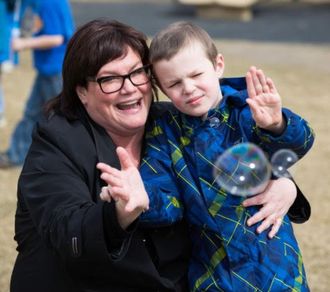
This year the teachers in our school handed out awards to students who showed Awareness. The students, staff, and parents joined us in wearing blue, and they learned about my son and others who are affected by autism.
I strongly believe that the best way to ensure David is seen as a meaningful contributor is to teach his peers, their parents, educators, future employers, basically everyone who may come in contact with him a little more about autism. By educating these children we are creating kind, empathetic adults. I want them to look at him and see potential. Events like this empower young children to be empathetic to take that extra time to understand. Thank you to our school, the staff, the parents, and mostly the children for making it a success!
We Want to Hear From You!
Taking Care of You
I saw this in last month’s edition and wanted to share my take on the matter.
I remember when Conor was first diagnosed, I dived head first into learning EVERYTHING about ASD. Books, sensory tools, school and therapist meetings – anything that I could do to make things better and easier for him. It pretty much consumed all my of my time both day and night and I’ll admit it totally took over everything at home. It was all about ASD. I was in survival mode and I ate, drank and slept his diagnosis. I experienced lots of highs and very low lows in my mood, and when we had a bad day I took it completely to heart and spent hours trying to ‘fix it’ so it would not happen again. My family life and my interests totally took a back seat for a good year and a half. But I could not see it; I was on a mission.
Towards the end of last year, I hit a really low point. I could feel the warning signs of depression knocking. I had post partum depression after both my boys and knew that this was not a road I wanted to go down again. So off I went to my doctor, and with treatment and therapy (which I still attend every month), I got back on track again after a few weeks.

Then I turned attention to myself. Looking back, by pushing aside everything that I enjoyed doing to focus on Conor, I was actually doing more harm than good. I was not feeling good about myself or in myself and it showed. It was hard to stay calm, have the energy to do activities with the kids and still have time to spend with my husband and friends. I realised I needed to be very strong for Conor to help him with his struggles and to be the best advocate I can be for him. I needed to start doing some things for myself again. So, I started back at the gym and yoga and set myself a few goals for 2016. I made a conscious effort to have more 1-on-1 time with the rest of my family.
I’m doing so much better mentally and physically. I’m enjoying my activities, attending our support group meetings and therapy sessions, and getting out in the community with my children so much more and connecting with people who ‘get it’ – all of which has been fantastic for us.
Yes we still have our tough days but I am in a much better frame of mind to deal with them and work through them. I look at the ‘why’ now and ways to get through, rather than just shutting myself off from everyone.
Taking care of me is a MUST. I need to be as strong as I can be for Conor to give him the support he needs. I am his rock and he needs me to give him that stability to help him succeed.
So please don’t feel guilty about taking some time for yourself. IT’S VITAL! Make it a part of your routine!
Cycle for Autism Edmonton 2016
Online registration is NOW OPEN for the 2016 Cycle for Autism!
